The Dezerter Bazaar in Tbilisi
The Dezerter Bazaar in Tbilisi
A Brief History of the Caucasus: between the Russian Empire and the Soviet Union
In those tumultuous years between the collapse of the Russian Empire and the inauguration of the USSR – a time when short lived republics rose with optimism and fell with heartache – the Caucasus, thanks to its strategic position and confounding geography, endured staggering change.
Governments came and went, borders shifted like writhing snakes and people too moved hither and thither – myriad human stories unfolding for manifold reasons.
Along with the ebb and flow of the human tide that washed across the Caucasus from the East, South, and West at this time, many poured in from the North also. In early 1921, the Red Army invaded Georgia, re-establishing Russia’s grip on a country and region which had been enjoying a brief period of independence.
The short-lived Democratic Republic of Georgia fell, losing swathes of land to Turkey in the process. Further territories were somewhat arbitrarily ceded to Russia, Armenia, and Azerbaijan. These were swift and often ill-thought decisions that would have major consequences in the decades to come, creating problems which remain unresolved a century on.
But back in 1921, with a slimmed-down Georgia under the weak control of the Bolsheviks and the USSR not yet inaugurated, Tbilisi briefly existed as something of a hinterland city – a place for vagabonds, runaways, and bohemians. It was a place for self-imposed exiles to disappear.
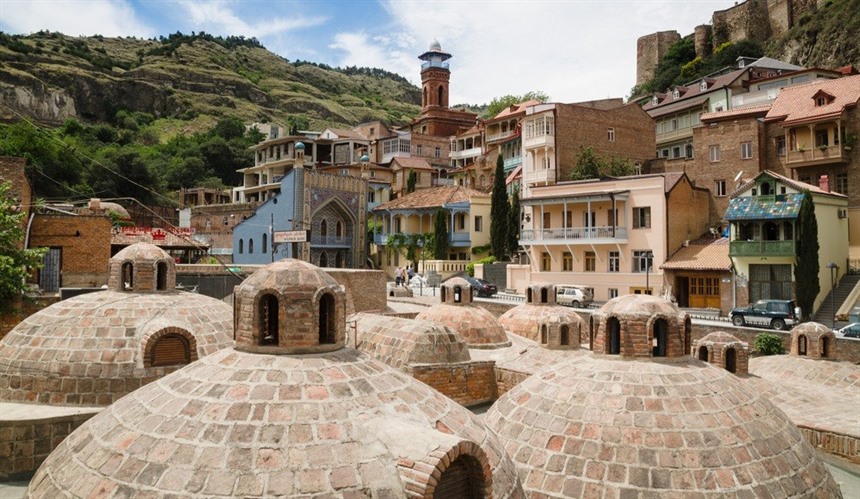
Origins of the ‘Deserter’s Market’ in Tbilisi
Many of those who washed up in Tbilisi at this time found themselves milling around the city’s bustling railway station, where a small-yet-growing flea market stood.
If the market had an official name back then, nobody today would know it, for in the early 1920s the market was briefly full of Red Army deserters – men who would sell anything they could to make ends meet and escape the army they had been fighting for or the old life they had left behind north of the Caucasus.
Uniform, weapons, wares – seemingly anything was available for sale if the price was right. As such, the market was given a colloquial name, one which eventually stuck and remains to this day: Dezerter Bazaar or ‘the deserter’s market’.
In December 1922, one hundred years ago to the month, the USSR came into being. Although the deserters sensibly disappeared as quickly as they had arrived, the market lived on, continuing to grow into a bustling bazaar, where life has now gone on with little change for a century.
The train station has changed slowly also, rebuilt in the 1940s and again in the 1980s into its current guise, when trains still ran to Russia. Before the tracks and many ties were so painfully severed.
But now, a century on, the deserters from the north have returned.
Get inspired with more first-hand experiences of Tbilisi: The Road to Tbilisi.
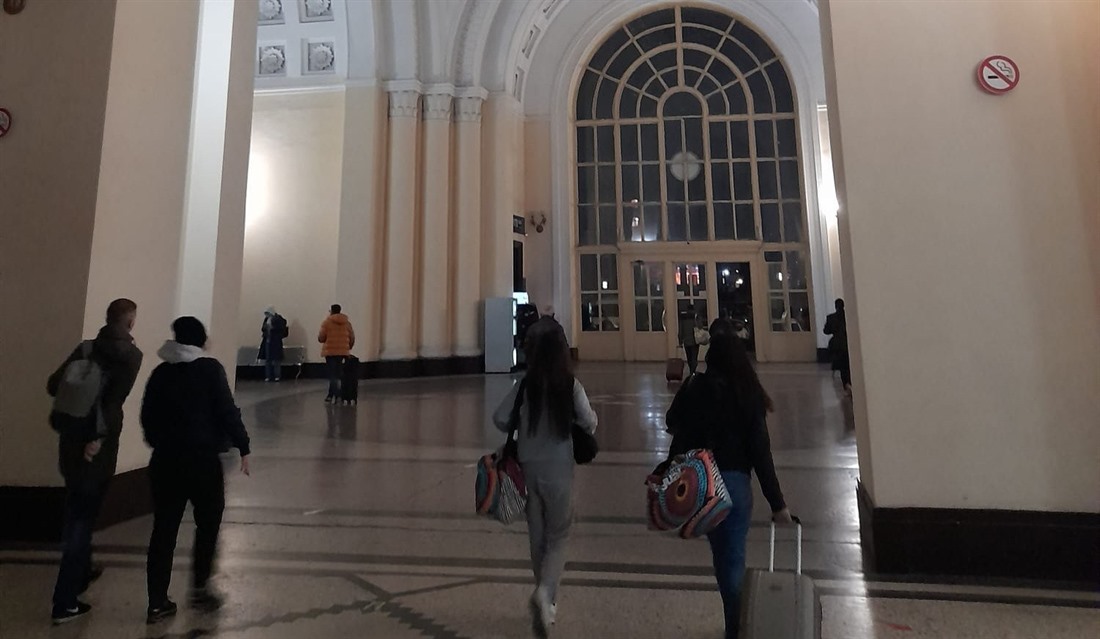
First Impressions of the ‘Dezerter Bazaar’
“The Dezerter Bazaar”, mutters my frustrated driver Mamuka as he points out of the window of his car in the general direction of the sprawling market– so close, yet in Tbilisi’s oft-gridlocked streets, so far.
We creep forward in the late afternoon traffic as pedestrians overtake us, weaving between vehicles as they go about their lives. Before us looms Tbilisi’s brutalist Railway Station.
Today the station is more of a shopping centre than a transport hub, its platforms and rails hidden underneath a sea of ageing concrete – forlorn and withered appendages from a different era.
Outside, to my right, three conspicuous men weighed down with cases are negotiating with a taxi driver, the discussion appearing linguistically strained.
“Russians”, sighs Mamuka as he looks in their direction. “Russians everywhere in Tbilisi now”, he smiles morosely, his thick accent unable to hide the touch of contempt and sadness in his voice. He then lets out a little snigger… “the deserters have returned!”
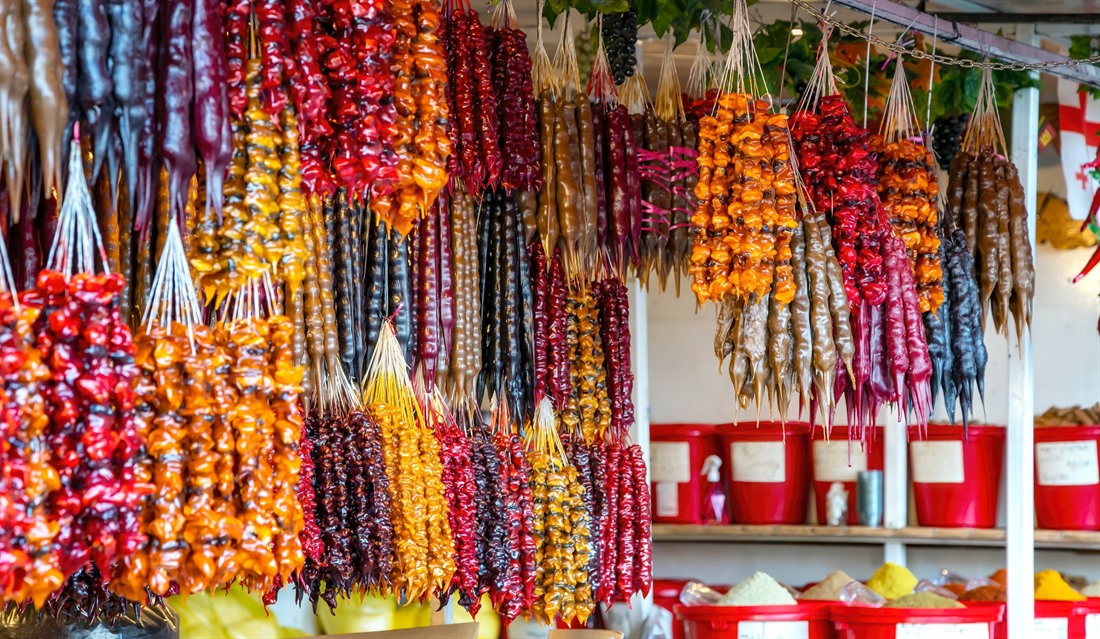
Return of the Deserters
Indeed, the ‘deserters’ have returned.
In my twenty plus years of on-and-off travels to Georgia, Russians have never been particularly evident in the country. Yet suddenly, central Tbilisi is full of them – people once again running away from something back home.
It seems, however, that for every single Russian in Tbilisi, there are multiple reminders of why they are here, for the city’s streets are awash with a mind-boggling patchwork of Ukrainian flags and bunting. The azure and yellow of the Prapor Ukrainy brightens countless shopfronts, balconies, and windows on this dim December day.
As a further show of Ukrainian solidarity, down at street-level, a good deal of fresh graffiti puts Putin, sometimes literally, in the crosshairs.
Mixed in with the many Russians, some Ukrainians endure in Georgia also – displaced citizens eager to return home when they can. Many businesses in Tbilisi proudly advertise discounts for Ukrainians – a promotion I can’t help but think is as much about public relations and annoying the Russians as it is about helping the small number of Ukrainians customers who may come knocking.
Giving up in the traffic, we park up at the roadside and make our way to the train station on foot. We briefly pop into the fringes of the sprawling bazaar to pick up some supplies for the overnight train journey to Armenia.
Read a journey through the cultural treasures of Armenia for more travel insights on this fascinating destination.
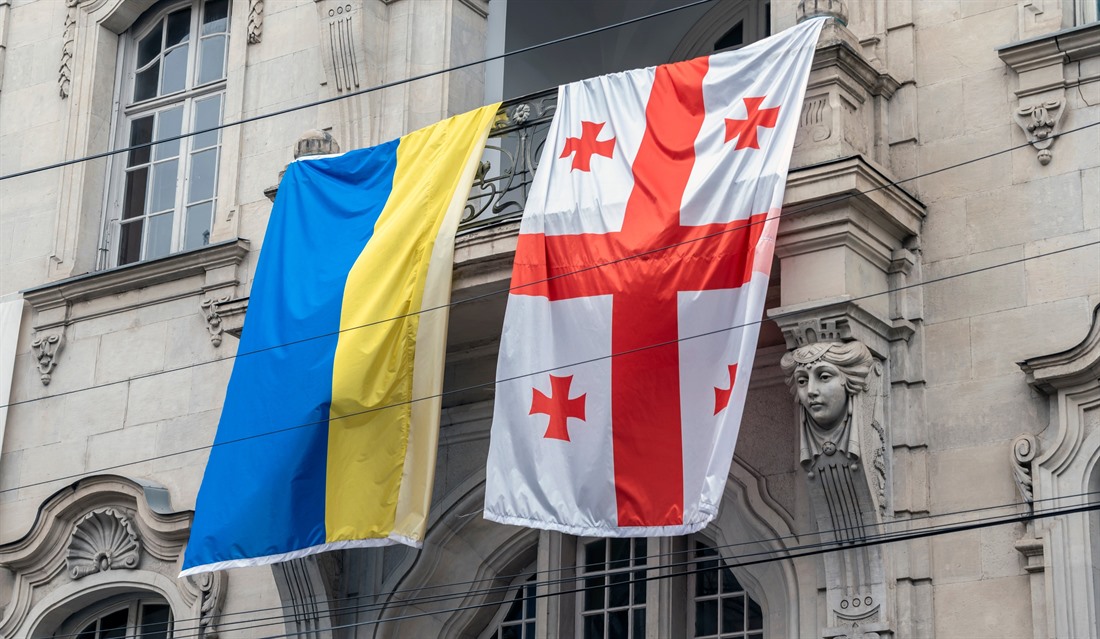
A Russian Encounter
Down on the pavement, positioned between a pawn shop and an off-license, stands a bedenimed Russian busker, perhaps in his late twenties. He is strumming, singing and whistling his way through Winds Of Change, an open guitar case at his feet.
A few coins, enough perhaps for a coffee and light bite, are scattered in the case. A tatty sign taped inside it, written in Russian, Georgian, and English espouses peace, friendship, and his love of Georgia.
Take me (take me) to the magic of the moment On a glory night (a glory night) Where the children of tomorrow dream away (dream away) In the wind of change (the wind of change)
The song’s familiar hope-filled lyrics, written during the flailing death throes of glasnost, are perhaps more poignant now than they have been in decades. The championed winds of change have somehow shifted direction, driving this poor chap from his home and country; that positive forecast of 1990 no longer so bright.
“Privyet” (hello) he mouths to me in Russian, smiling, as I pop into the off-licence behind him, emerging minutes later with a half-bottle of red wine packed safely away inside my rucksack.
The busker is tuning up, about to start another number. I place some small change, useless to me where I am headed, into his case and he immediately starts talking to me in Russian.
The flash of excited camaraderie on his part evaporates the moment he realises I only understand a smattering of what he is saying. He switches to a heavily accented English: “I am sorry – you aren’t Russian?”, he asks matter-of-factly.
“No, no”, I respond politely, “I’m from England.”
An apologetic, almost embarrassed look crosses his face, and he briefly purses his lips, as if thinking what to say.
“You know, we aren’t bad people. We aren’t…Russians are good people. We don’t want this present situation.”
It is pitiful that this stranger feels he must apologise for who he is and where he is from, but such is the world we live in. Of course, there is no need for him to tell me why he is here – everyone knows.
“There is no need to explain. I have visited Russia a few times – it’s a wonderful country.”
He smiles, “Yes, mostly. Just, you know…governments.” “Well,” he says, looking at my rucksack and glancing up to the station, “safe travels!”
He looks away and continues with tuning his guitar. As I wish him well and turn away, off in search of walnuts and khachapuri, he starts another carefully chosen number.
Yesterday all my troubles seemed so far away. Now it looks as though they're here to stay. Oh, I believe in yesterday.
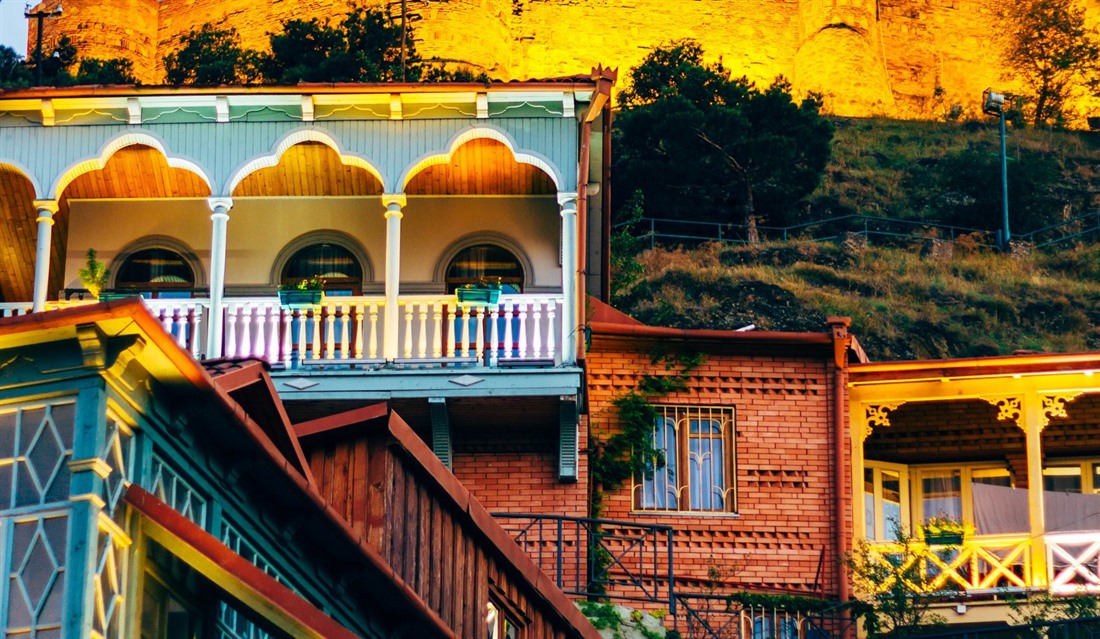
Departing Tbilisi
Waiting underneath the digital departures board inside the train station, Mamuka says, somewhat gravely after a few moments of silence:
“You know, I am Georgian. I have family in Kyiv, family in Russia and was born to the Soviet Union. It is all very difficult – hard for us to imagine how all this has happened. And now you have seen while here in Tbilisi, how many of these deserters we have in our city. And we take them in – even though the Russians took Abkhazia, took South Ossetia! But this is always the Georgian way. Hospitality.”
I nod contemplatively…it is now my turn to purse my lips. Another pause as we both look to the board, scanning it for my platform number. We commence our goodbyes and make small talk as we wait for an update.
“Ah – Yerevan, Platform 2. Time to board! Well, my friend – next time.” We part with a firm handshake.
As I head down the steps to set off on my Armenia-bound sleeper train, I see that the bulk of those travelling to Yerevan are young Russians – overladen couples, some with babes in arms.
They too are running away from the problems back home, looking for a port in the storm. I hope that they – along with the busker and the hundreds of thousands of other self-imposed Russian exiles in the Caucasus – can soon stop running and return home.
I hope that these winds of change will shift once again, allowing these new ‘deserters’ to quickly disappear, just as they did a century ago.
Not sure where to go in Armenia? Read: 7 Places to visit while you’re in Armenia
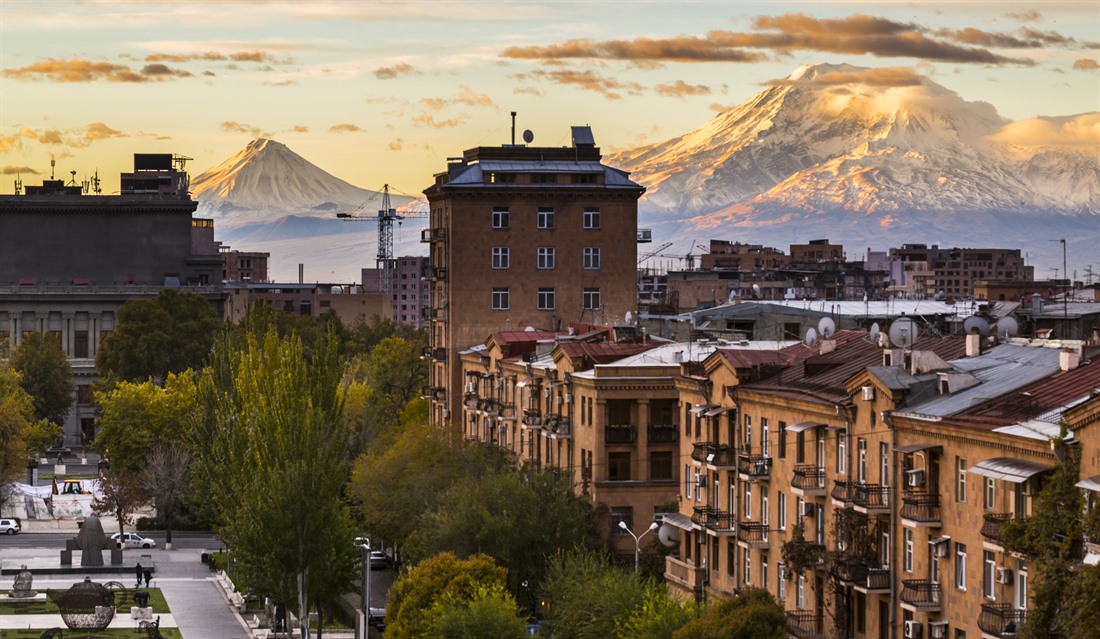
Get in touch with our Travel Specialist to plan your own great adventure in the Caucasus.